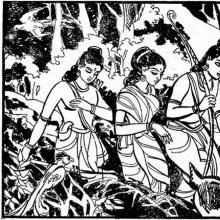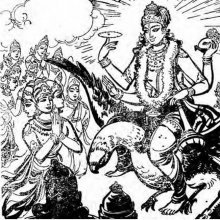Undisturbed: 1 definition
Introduction:
Undisturbed means something in Hinduism, Sanskrit. If you want to know the exact meaning, history, etymology or English translation of this term then check out the descriptions on this page. Add your comment or reference to a book if you want to contribute to this summary article.
Images (photo gallery)
In Hinduism
Yoga (school of philosophy)
Source: ORA: Amanaska (king of all yogas): A Critical Edition and Annotated Translation by Jason Birch(Being) Undisturbed is denoted by the Sanskrit term Nirvikāra, according to the Amanaska Yoga treatise dealing with meditation, absorption, yogic powers and liberation.—Accordingly, as Īśvara says to Vāmadeva: “[...] Some have intellects which have become insensitive through reasoning and [philosophical] speculations, [and some] are elevated by [their] conceit and ego. Some are self-satisfied with pride, [rendered] stupid by [their obsession with] caste, and [some] are confounded by activities such as meditation. Generally speaking, the multitudes of people have deluded minds and various [mental] disturbances, for, those who experience nothing but the bliss of the undisturbed (nirvikāra), natural [no-mind] state, are not seen in the world. [...]”.

Yoga is originally considered a branch of Hindu philosophy (astika), but both ancient and modern Yoga combine the physical, mental and spiritual. Yoga teaches various physical techniques also known as āsanas (postures), used for various purposes (eg., meditation, contemplation, relaxation).
See also (Relevant definitions)
Full-text (+178): Akhandita, Avyagra, Abhangura, Nirabadha, Aninjita, Avikhandita, Avikshubdha, Avikshobhita, Nirakula, Aparavojjhita, Anavila, Ekagrata, Nirupadrava, Aklishta, Asapatna, Aparibadha, Nirudvigna, Nirbadha, Nirudvega, Nirvighna.
Relevant text
Search found 157 books and stories containing Undisturbed; (plurals include: Undisturbeds). You can also click to the full overview containing English textual excerpts. Below are direct links for the most relevant articles:
Yoga-sutras (with Vyasa and Vachaspati Mishra) (by Rama Prasada)
Sūtra 2.26 < [Book 2 - Practice (Sādhana)]
Sūtra 1.47 < [Book 1 - Trance (Samādhi)]
Sūtra 3.10 < [Book 3 - Attainment (Vibhūti or Siddhi)]
Yoga-sutras (with Bhoja’s Rajamartanda) (by Rajendralala Mitra)
Sūtra 2.26 < [Second Chapter (Sadhana Pada)]
Sūtra 2.33 < [Second Chapter (Sadhana Pada)]
Sūtra 3.2 < [Third Chapter (Vibhuti Pada)]
Satapatha-brahmana (by Julius Eggeling)
Kāṇḍa VIII, adhyāya 5, brāhmaṇa 1 < [Eight Kāṇḍa]
Kāṇḍa VI, adhyāya 4, brāhmaṇa 2 < [Sixth Kāṇḍa]
Kāṇḍa XI, adhyāya 1, brāhmaṇa 3 < [Eleventh Kāṇḍa]
Bhakti-rasamrta-sindhu (by Śrīla Rūpa Gosvāmī)
Verse 1.3.27 < [Part 3 - Devotional Service in Ecstasy (bhāva-bhakti)]
Verse 1.2.114 < [Part 2 - Devotional Service in Practice (sādhana-bhakti)]
Guhyagarbha Tantra (with Commentary) (by Gyurme Dorje)
Text 20.13 (Commentary) < [Chapter 20 (Text And Commentary)]
Text 2.15 (Commentary) < [Chapter 2 (text and commentary)]
Chapter 20 - Consecration of Spontaneous Enlightened Activity < [Chapter 20 (Text And Commentary)]
Sankhayana-grihya-sutra (by Hermann Oldenberg)
Related products



